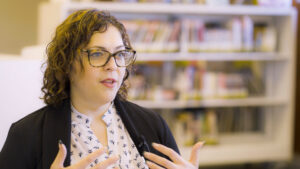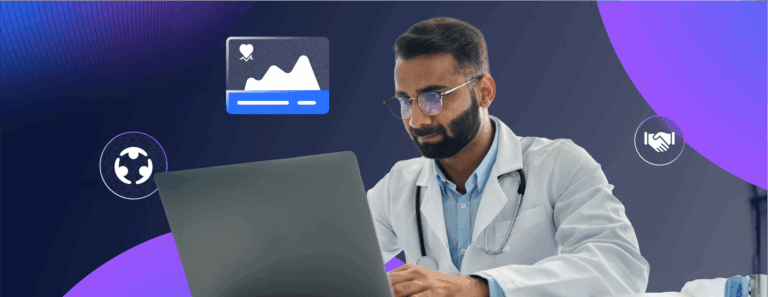
A Chat with the VP of Community Health and Engagement at ChristianaCare
Editor’s Note: Back in February, Unite Us spent a day with Erin Booker of ChristianaCare, our Delaware partner. We had a wonderful conversation about what motivated them to launch a coordinated care network and why Unite Us was their right choice. While the interview happened before the pandemic struck, we’re sharing it today because Erin’s words are even more relevant and striking as communities across the nation grapple with the immediate health crisis and look for an effective solution and path forward when recovery begins.
In her role at ChristianaCare, Erin oversees the Community Health Department, including community outreach. More specifically, this includes:
- Helping people with substance use issues and engaging them into treatment
- Educating parents about safe sleep and breastfeeding babies
- Teaching teenagers about reproductive health
- Providing a robust community health worker program that focuses on at-risk moms and people with chronic diseases
- Addressing barriers to health within the community, particularly for people with high-needs
UU: Thank you for taking the time to chat with us today. Can you give a little background about the problem you were facing?
EB: Our patients were running around to different places trying to get their needs met and most of the time would give up. We could see the impact on health outcomes, certainly, but just having a conversation with them, you could see this level of hopelessness. We would always say, “here’s where you can get food,” and cross our fingers and pray they made it there and got the food that they needed. But we didn’t know.
UU: So what made you choose Unite Us to help?
EB: We chose Unite Us because I know. I know if I send someone to the food bank because they need food, I know who said yes. I know they got there. And if they didn’t, I know I can reach back out to that patient and make sure they’re looped back in in a different way. So the outcome capability of that was huge for me.
UU: What about your providers? What were their challenges?
EB: If you come into a primary care office and you have a basic need–maybe you don’t have heat in your house–you can’t worry about primary care visits when you’re worrying about staying warm in the winter. Our doctors don’t want to just ask the question and have no way to help. By partnering with Unite Us, we’re really showing the doctors that they did help and here’s the proof that their patients’ needs were met. That’s huge in the health industry. We’re very committed at ChristianaCare that it’s not about what happens in clinical care only. It’s really about what happens in the community–where they live, where they work, where they play.
UU: Initially, what was the greatest obstacle you faced?
EB: For our communities and CBOs, it was connectivity: that ability to get all your referrals made and someone owns that and they’re helping you work through it. That has been the biggest barrier that we’ve really seen improve almost immediately with the launch of Unite Delaware, with Unite Us.
UU: Why does meeting community needs matter so much to you?
EB: ChristianaCare is very dedicated. And we talk about our patients as our neighbors. Many work for us. Being a part of this community is central to who we are as a hospital. We took the words health system out of our name so it’s just ChristianaCare, because we are not just a health system. We are very committed to being a system that is bringing care to people where they need it, where they trust and where they feel safe to get support. It doesn’t have to be within the four walls of a hospital. We’ll come out to you, and to do that, we’re going to help you live the best life you can.
Whether you’re an actual patient or not, your health impacts the health of the person down the street from you. Whether there are lights on in your neighborhood matters. Whether you have access to a grocery store matters. We know that 20 percent of a person’s health happens in a health system, 10 percent is DNA, and 70 percent is your environment and all of the challenges you’re facing. So if we don’t say we’re committed to ALL of you, then we’re really not providing true care and that’s just not who we want to be. We’ve made a really strong commitment to break down barriers and support CBOs to do what they do really well, not come in and say you have to do it this way. It’s why Unite Us is awesome; they work with our partners and say, “How can we serve you? How can we help you to be your best version of your organization?”
UU: What was the response from the CBO community?
EB: Their immediate reaction was excited and very inquisitive. It’s been interesting for us to watch them to figure out how to be better partners together through the platform. People are saying that this is what we’ve always needed but we never had the capacity. There’s always going to be people who are a little concerned about new things coming in, but the more we get people involved and engaged, the more people are asking to join.
UU: What stood out about Unite Us when you were making the decision?
EB: When we were making a decision to create this platform, we looked at a lot of different companies. It came down to two things for me as I was making the final decision. It was:
- Will they be a true partner or will they make us a platform, give us a few weeks and walk away?
- Can I see the results?
The result of the referral is important to me for more than one reason. Certainly I want to be sure that the people we’re serving are getting their needs met. And it’s also important to help me understand, as I’m strategically making investments, where to invest. As we’re talking about community benefit, I want to make sure the benefit I put out there is really impactful. The Unite Us platform gave me the opportunity to see where we’re really lacking in our community, so I knew how to drive investment dollars. That’s a really big deal for me. The partnership with Unite Us and our community has been phenomenal. No one has ever felt alone and that’s what I always wanted. I didn’t want my community partners to feel like we handed them something they didn’t know how to use and it becomes burdensome.
The Unite Us staff has a genuine desire to see people’s lives improve. This isn’t a bunch of IT people walking in with a platform and saying here you go: plug and play. It’s people who are really engaged in the idea of helping people live the healthiest life they can and they work tirelessly at that. And so that’s been really exciting. They are really responsive. And they really understand the challenges in our communities and for our community partners, so as they’re trying to help them navigate, they’re just very patient and very kind and that’s huge.
UU: Overall, what has the process been like?
EB: Since we said yes, it’s been a really smooth process. The implementation has been fantastic because we worked a lot with our internal partners at ChristianaCare and identified who they refer to, who in the community they work the most, and made a list of amazing community partners and the top needs. The best part was that we didn’t do it alone; the Unite Us team guided us through every step. They made sure we knew what were the highest priorities for the types of organizations. We gave them a huge list and they helped us distill that list. Then when we have our strategic sessions where we’re showing the platform and the Unite Us team is there, clearly excited, it energizes the whole room. We’re now going into meetings and hear people say, “Hey did you hear about Unite Delaware?” Now I get calls from all over the state about it.
UU: What are you excited about next?
EB: Next steps for Unite Delaware is to absolutely go fully statewide and we’ve worked really hard to make sure we’ve aligned with state partners and the work they’ve done–bringing them together so it’s one voice, one platform going forward. I think that’s really important to make sure you’ve aligned and engaged with state partners. We’ve done that before we ever signed our contract and the Unite Us team has supported that in every possible way.
UU: What were some critical lessons learned during the process of moving towards a statewide network?
EB: Having face-to-face, open dialogues is really important to identify needs and how the platform can inform those needs. Also, be quiet and let people tell you what they need, why they want to see this platform come to the state, and how we can mould it to make it what they need as well. Then, you have to be willing to lean in and say, “We’re going forward and we’d love you to join us, but we’re going either way.”
UU: If you could wave a magic wand and had no barriers what would you do?
EB: If I could wave a magic wand around our work with social determinants of health (SDoH), what I would do without question is make sure that every anchor institution in our state is at the table and that we’re one platform throughout our state–which is where we’re going and that’s the plan. The more anchor institutions we can pull together, the more we can drive outcomes at the end by making sure we have capacity in our community.



